Recently, I stumbled over an interesting book: “Dagongmei” (by Pun Ngai and Li Wanwei), translating approximately into “Working Sisters”. This term is used for young women from the countryside who are migrating to Mega-cities such as Shenzhen or Dongguan to work there in factories producing for the global market.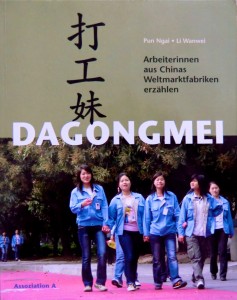
Voice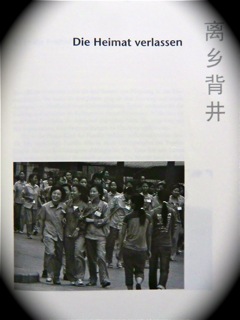 s of the voiceless. Testimonies of Chinese dagongmei …
s of the voiceless. Testimonies of Chinese dagongmei …
… is the original title of the book in Chinese. It is based upon interviews with young Chinese working women – a collection of 12 personal accounts where these women are talking about their family histories, their reasons for leaving home, the experiences they have made in a range of different jobs, the mostly exhaustive, boring or harmful working conditions and their little free space and time.
Dreams, Hopes & Visions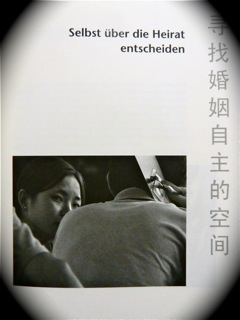
These women all grew up in the countryside, most of them left home very early, sometimes at the age of 15 or 16, traveling alone to a remote big city. They were looking for work, often without having finished school or without a specific education – and their reasons were manifold: to escape traditional family structures and hierarchies mostly discriminating for girls, to avoid arranged marriages, to earn their own money, to gain some independency and freedom, to experience urban lifestyle. So they are driven by the urge to escape from something while at the same time being attracted by the possibilities of a more modern lifestyle.
…and Reality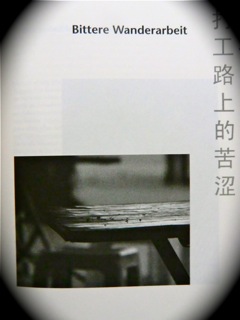
Eventually, many of these women find themselves trapped between social traditions, demands concerning their family duties as women, and the desire for a more autonomous life in the city. It´s an emotional oscillation between feeling homesick and a sort of wanderlust. They are looking for a new role for themselves within the changing Chinese society – and this sometimes leads to a feeling of isolation, of some kind of restlessness. They want to make their own money, and very often have to accept poor living conditions while at the same time gaining self-confidence.
Making contemporary history tangible
The most important point of this book is that by these personal stories a lot of recent problems in fast changing China become tangible: e.g. traditional social structures alongside a growing urban middle class, the issue of migrant workers, questions of 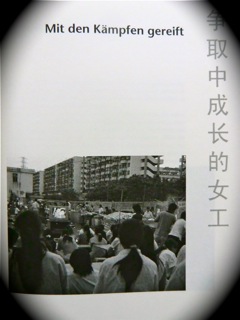 occupational safety and health, restrictions of the hukou system in times of an increasing urbanisation.
occupational safety and health, restrictions of the hukou system in times of an increasing urbanisation.
What I personally find a bit annoying is the somewhat “leftish” language of the authoresses, implying a still on-going class struggle, and sounding sometimes as if the social structures and circumstances during the Mao era, the times of the “iron rice bowl” would still be worthwhile to follow.
But, as already described, the essential achievement of this publication lies in the fact that these narrations illustrate on an individual level the simultaneity of contradictory and often conflicting living conditions. Recent developments in China as well as potential resulting consequences thus obtain a concrete shape.
Further bits:
Interestingly, this book has been translated only into German so far. But for what reasons the preface to the German edition is written anonymously – we don´t know.
Also by Pun Ngai, on the same topic: Made in China.
Chinese Working Women Network.

April 11, 2025 um 14:57 Uhr
Hello, i think that i saw you visited my blog so i came to
“return the favor”.I am attempting to find things to enhance my web site!I
suppose its ok to use some of your ideas!!
März 19, 2025 um 22:43 Uhr
Howdy! Do you know if they make any plugins to assist with SEO?
I’m trying to get my blog to rank for some targeted keywords but I’m not seeing
very good results. If you know of any please share. Thanks!
März 13, 2025 um 14:28 Uhr
Hi my friend! I want to say that this post is amazing,
nice written and come with almost all important infos. I’d like to look more posts like this .
März 9, 2025 um 15:57 Uhr
I loved as much as you’ll receive carried out right here.
The sketch is tasteful, your authored subject matter stylish.
nonetheless, you command get got an shakiness over that you wish be delivering the following.
unwell unquestionably come more formerly again since exactly the same nearly
a lot often inside case you shield this
increase.
März 9, 2025 um 15:56 Uhr
excellent points altogether, you just gained a new reader.
What may you suggest about your put up that you simply made some days in the past?
Any certain?
November 1, 2024 um 08:50 Uhr
Hello there, You have done a great job. I will certainly digg it and personally recommend to my friends.
I’m sure they’ll be benefited from this web site.
Oktober 12, 2024 um 10:36 Uhr
If you would like to grow your familiarity simply keep visiting this web page and be updated with the latest gossip posted here.